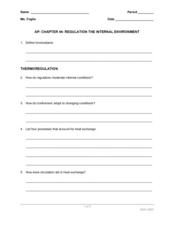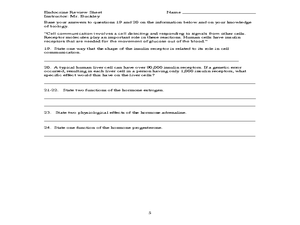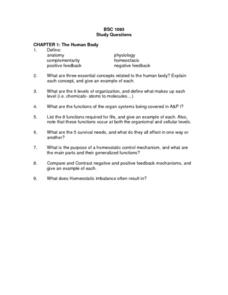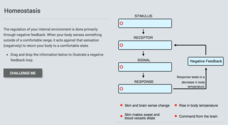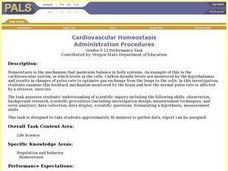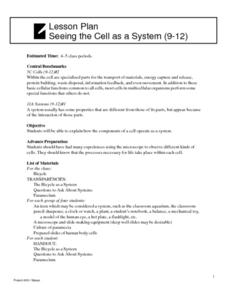Curated OER
AP: Chapter 44: Regulation of the Internal Environment
When nature calls, you need to answer. Physiology learners discover that it is a just your body's way of regulating pressure and water content. Along with osmoregulation, they also examine thermoregulation, two vital processes with which...
Serendip
Homeostasis, Negative Feedback, and Positive Feedback
So many bodily activities depend on homeostasis! Give learners a solid background to understand the basic process of the human body. Scholars first examine negative feedback loops contributing to body temperature regulation and then a...
Curated OER
Endocrine Review Sheet
Starting with a diagram of the kidneys and urinary tract of the human, this sheet has questions about excretion, blood concentrations of hormones, gland feedback mechanisms and the effects of some hormones.
Curated OER
Cellular Respiration: Other Metabolites and Control of Respiration
The feedback mechanisms of metabolism of a variety of substances in the human body. Carbohydrates, lipids, amino acids, and their derivatives are explained. The biochemistry required to explain the metabolic balance and feedback controls...
Curated OER
Maintaining the Internal Environment
Explore homeostasis in animals with this all-encompassing worksheet. Advanced biology pupils consider a variety of mechanisms for maintaining internal conditions such as temperature and waste products. Eighteen short-answer questions...
Curated OER
The Human Body Study Questions
In this human body study question worksheet, students define 6 words associated with the human body. They answer 8 short answer questions about the organization and function of the organ systems and organization structure of the human body.
University of Minnesota
Homeostasis of Thermoregulation
Whether you're battling the flu or trying to warm up on a chilly day, your body's ability to react to temperature change is fascinating! Anatomy scholars discover the fantastic feedback loops that control body temperature in a rigorous...
CK-12 Foundation
Skeletal System Joints: Appendages
The hundreds of joints in the human body fit into five main categories. A quick video explains the joints in the skeleton, which are often the most confusing. The interactive reviews each of the five types of joints and has scholars...
CK-12 Foundation
Homeostasis
How much negative feedback does a body get daily? The interactive walks through one negative feedback loop, increasing body temperature. Then it challenges scholars to relate this to mechanical feedback loops and disorders that prevent...
University of Minnesota
Virtual Neurons
It's electric! Young anatomists use Virtual Neurons software to build, control, and analyze complex nerve circuits within the body. Colorful and packed with content, class members enjoy interacting with the nervous system at a personal...
Curated OER
Homeostasis
In this homeostasis worksheet, learners answer twelve questions about positive and negative feedback loops and how they effect homeostasis.
Curated OER
How Cells Harvest Energy
Survey the metabolism process from respiration through the production of the ATP molecule with this seven page AP biology worksheet. Pupils write short answers on the lines provided and label a diagram of the cellular respiration process.
University of Minnesota
Mirroring Emotions
Do you ever give your class the "teacher look"? Without saying a word, they become silent and engaged (hopefully). How do they know what you're thinking? Explore the concept of nonverbal communication and how it relates to our mirror...
University of Minnesota
Dendritic Spines Lab
This is your brain on drugs ... literally! Your neuroscientists-in-training examine the evidence of drug use on the human brain and how neurons change their connectivity when altered by drugs. They then work together to create testing...
University of Minnesota
Sheep Brain Dissection
Bored with frog and earthworm dissections? Had your fill of fetal pigs? Anatomy students will be intrigued by the sheep's brain, and you will be prepared with guiding questions, extension activities, and pictures as they dissect one —...
University of Minnesota
Neurotransmission Model
Don't lose your marbles — you'll need them for a lesson on neurotransmission. Young scholars build a neurotransmission model using marbles, beads, rubber bands, string, and other elements. After studying specific neurotransmitters,...
Curated OER
Compare Human-made Objects with Natural Objects
Students examine and observe how many human-made objects get their basic design from things in nature. They listen to the book "Nature Got There First," compare/contrast hollow bones with drinking straws, bird beaks and tool pliers, and...
Curated OER
Cardiovascular Homeostasis
High schoolers develop and conduct an experiment to answer the question," How does cardiovascular exercise affect the pulse rate?". They record the changes to heart rate during different levels of exercise.
Curated OER
Seeing the Cell as a System
Students explain how the components of a cell operate as a system. Students examine a bicycle and find out if parts were arranged differently, could the system still be carried out. They look at cells as well and see what function they...
Texas Education Agency
Texas Gateway: Internal Feedback Mechanisms
A learning module that explores how our body has internal feedback mechanisms to maintain homeostasis.
University of Hamburg
University of Hamburg: Homeostasis Some General Principles
An online, college-level textbook about homeostasis. Find out what it is, and how this function allows us to stay alive.


